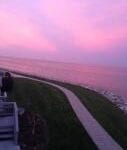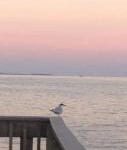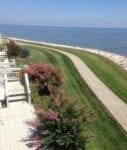Written by Thu Tran, MD,FACOG
July 31, 2016

“That’s what we are all looking for. A certain peace with the idea of dying. If we know, in the end, that we can ultimately have that peace with dying, then we can finally do the really hard thing…
Make peace with living.
It’s natural to die. The fact that we make such a big hullabaloo over it is all because we don’t see ourselves as part of nature. We think because we’re human we’re something above nature.”
The above passage was from a conversation between Mitch Albom and his professor at Brandeis University Morrie Schwartz who died of Lou Gehrig’s disease or ALS. In his 1997 bestseller “Tuesday with Morrie,” Albom wrote about dialogues he had with his favorite professor Morrie on his Tuesday visits before Morrie succumbed to his incurable illness. The readers learn how Morrie lived his life, how he felt about death and dying, aging, fear, regrets, family, emotions, the kind of topics we all should reflect on deeply but often have little time to do in our constantly busy lives.
Our neighbor Ann died last Sunday. We got news of her passing the last morning we were in New Hampshire to celebrate a cousin’s 60th birthday. We were ready for a special family moment when Ann’s husband called my husband David. It was about nine months ago when Ann was diagnosed with esophageal cancer. She fought her stage four cancer very hard, driving more than an hour many days, even in the deep of winter, to Johns Hopkins hospital in Baltimore for intensive treatment with radiation and chemotherapy. Like most people with advanced esophageal cancer, none of the aggressive treatment regimens worked for her.
It’s always peculiar that we tend to know our friends or acquaintances more in death than in life. At Ann’s service, so many details about Ann emerged from comments shared by different people who knew her at various stages of her life. I have always realized how brilliant, funny, witty, strong-willed Ann was, but did not know she was the first woman ever to graduate with a degree in naval architecture engineering in England. Her graduation was an act of “breaking the glass ceiling,” and it was covered by the media. I did not remember how this petite British woman traveled from Cornwall, England, as a child, to different parts of England, then to the U.S. as an adult, after living in multiple places including Spain and Australia.
Ann never stopped living during her illness. She continued to work in Washington, DC as a naval architect, commuting from her house on the Chesapeake Bay. She continued her daily walk in the neighborhood even on days when she was exhausted from her treatment. The long boardwalk strolls of the town at the beginning of her illness and treament eventually became a few steps from her backdoor to the neighborhood pool. She still sat by her balcony watching the sunset, although she could no longer enjoy a glass of wine. She was unable to drink or eat for the eight months before she died, not even a sip of water. At the beginning of her illness, she was able to drink and enjoyed the clear soup I made weekly for her. I daydreamed that the soup, full of different vegetables, would serve as a concoction to stop the spreading of the beast in Ann. Somehow, the beast kept multiplying its destructive force.
Ann made efforts to attend many events in this small town on the Chesapeake Bay where she moved four years ago from a bigger suburb in Northern Virginia. We continued to go to the Farmer’s Market on Fridays whenever I could come down from Potomac. She walked with us to North Beach last Christmas for the town’s yearly Christmas parade. I had a strong sense it was her last Christmas. I took photos of her sitting on a bench watching in delight the parade and enjoying being showered with candies tossed over from participants in the parade.
A few weeks ago, on July 3, my husband David helped Ann come down from her bedroom upstairs to watch the town’s fireworks. We knew it was to be her last fireworks and she wouldn’t want to miss it. She was laughing and smiling with her friends that night, on the balcony, when the sky on the bay lit up with colorful fireworks.
Two days before she died, Ann’s colleagues came to show their appreciation for her work. Among several gifts which delighted her, they brought a big photo displaying sixteen out of the sixty ships that Ann had helped design and build. All her colleagues’ signatures could be seen in this beautiful photo.
In life, we always deal with beginnings and ends, but death is the true beginning of the end. Death doesn’t have to be ugly or sad, cruel or frightening. It can be a beautiful or peaceful process, like a wind carrying cherry blossom petals on their last dance on a spring evening, or the fluttering of golden leaves on a fall day, downward to their resting place, painting the brown earth with their golden hues. Death can be a striking sunset to serenade the glorious end of a day, with the promise that the end will be followed by another beginning, as it’s the order of life. No sunrise or sunset seems to be the same, as all lives are different from others, all in their quiet ways, bring different meanings to the world.
Our friend Ann died early in the morning, at home, by her favorite window looking out to the vast waters of the Chesapeake Bay. The following two nights, ferocious storms lit up the sky, with rain soaking the town. Ann was no longer there to see the lightning on the bay, nature’s fireworks, or was she? Nothing is relevant to Ann anymore. No more football, field hockey, or soccer games. No more cooking or house hunting shows. No more debates on women’s issues, on global or British politics. No more sunrises and sunsets on the bay. No more boardwalks, festivals, holidays. No more trips back to England, to Cornwall where she was born or Sidmouth where she grew up and still loved dearly. Who would have thought her trip last year to England to visit her childhood friends and schoolmates was to be her last? Who would have thought years ago that her beloved Queen Elizabeth would someday outlive her?
Ann, you had never stopped living your life. You did not need to read Ronsard’s “Ode to Cassandre” to remind how you needed to “live now, pick life’s roses today.” You did not waste time thinking about the life you could have had or the unknown phase you were about to enter. You lived your days out, moment by moment as they came. I am not so sure you were mentally ready for your imminent death. Unlike Morrie, you seemed to keep fighting and I know why. You were fighting for several more days or weeks, so that you would see your unborn grandchild – due to be born in just two more weeks. You were waiting for this precious child to arrive before you were willing to bid farewell to all of us.
Fate has a way to end our life before we are ready to go. Fate has a way, however, to continue our existence through those for whom we love and care. In life, our dear friends and family members will think of us fondly, talk about us, eat our favorite foods, and visit our favorite places in our memory. You won’t cease to exist. You are no longer visible, but your essence will continue to be palpable. On my frequent runs or walks to North Beach, I will think of you when a bumble bee lands softly on a bed of pink and purple crepe myrtles. I will think of you when the sky is clear and somewhere on the beach, the sound of lively music from a boom box reminds me of the peak of summer. I will think of you when I stroll the Friday Farmer’s Market on North Beach, admiring the English garden bouquets from the Amish vendors, or drooling over the scent of baked goods or the colorful popcorn packs. I will think of you when the sun sets on the bay, when lavender and salmon rays gleam on the shimmering water, reminding me how beautiful this world is. No wonder you were not ready to leave. No wonder you lingered, like a long summer day, as if you did not yet have quite enough of your remarkable life.
Sleep well, dear Ann, sleep well and all will be well. I have, since you died, looked many times at a photo I took of you, on your 50 th wedding anniversary, raising a glass of your favorite wine. You could no longer drink, but managed to playfully stick your tongue out to lick the wine. Your eyes were bright, your smile was clear. Cheers to life, you were saying to yourself.
Cheers to no more suffering, Ann. All things pass.
All Things Pass – Lao-Tzu
All things pass
A sunrise does not last all morning
All things pass
A cloudburst does not last all day
All things pass
Nor a sunset all night
All things pass
What always changes?
Earth…sky…thunder…
mountain…water…
wind…fire…lake…
These change
And if these do not last
Do man’s visions last?
Do man’s illusions?
Take things as they come
All things pass
(from translations adapted by Timothy Leary [1920-1996])
Tags:










